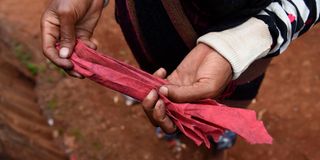Inside drive to improve menstrual health of low-income earners

A woman holds a piece of cloth she uses as sanitary pad. For lack of money to buy pads, some women use pieces of clothes. A new initiative seeks to boost the menstrual health of low-income earners.
What you need to know:
- Menstrual health management is crucial to the well-being and empowerment of women and adolescent girls.
- On any given day, more than 300 million women worldwide are menstruating.
An initiative to improve menstrual health and hygiene practices for low-income women in Kenya has been launched by Huru International and USAID.
It targets 22,500 women in garment production and horticulture, which are significant employment sectors for women, across Nakuru, Machakos, Kajiado and Nairobi counties.
The project aims to bridge the menstrual health gap for women who, because of poverty, often resort to unsafe and unsanitary alternatives.
This intervention will focus on enhancing their health, dignity, and equity at work by providing 22,500 menstrual packs containing Huru reusable sanitary pads and panties at 43 workplaces.
These kits will be supplemented with educational sessions on menstrual health and broader sexual and reproductive health topics, equipping women with knowledge and resources to seek medical support as needed.
Huru International founder Lorna Macleod expressed excitement about the partnership, saying it was long overdue.
Also read: Break barriers to menstrual health, hygiene
“Our partnership with USAID is game-changing. This collaboration is not just about providing menstrual products, it’s about empowering women in the workplace and challenging the status quo,” she said.
To cultivate a supportive work culture, the initiative will include awareness campaigns and activities reaching 13,600 supervisors and male colleagues to combat menstrual stigma and discrimination.
The positive change in the workplace is expected to lead to better menstrual management, reduced absenteeism and increased job satisfaction and retention.
Huru International Country Director Wanjiru Kepha said, “This initiative is transformative for Kenyan women in low-income jobs. It not only elevates their day-to-day lives but also unlocks untapped economic potential, paving the way for workplace gender equality.
"Huru International and USAID are committed to addressing gender inequalities and fostering more inclusive workplace environments, thereby advancing women’s empowerment and economic growth in Africa.”
Huru International has been at the forefront of empowering East African girls and young women through menstrual health education and resources since 2008, ensuring that young women receive the support they need to manage their menstrual health with confidence.
Also read: Menstrual health is a human rights issue
Many adolescent girls and women in Kenya experience problems with menstruation due to limited knowledge and poor access to safe and affordable methods and materials, with consequences in terms of poor self-esteem and infrequent school attendance, among others.
According to the Network for Adolescent and Youth in Africa, period poverty remains a pressing concern in Kenya, with many low-income women and girls struggling to access essential menstruation products such as sanitary pads, tampons, underwear, and pain medication.
The organisation notes that negative attitudes and misinformation about periods limit women and girls’ potential.
Also read: Let’s address period poverty
Too often, girls and women misroute on school and employment because of a lack of hygiene facilities and products to easily go about their daily lives while on menstruation. This presents a lot of risks in their daily lives.
“Young girls have been forced to go into the open to deal with their period needs, exposing them to physical and psychological harm and resorting to transactional sex to afford these supplies, highlighting the urgent need for action,” it says on its website.
Also read: We should normalise menstruation
Research indicates that Kenyan girls lack crucial knowledge about menarche and menstrual hygiene management (MHM), leading to harsh cultural practices and a limited understanding of the topic.
According to the World Bank, good MHM plays a fundamental role in enabling women and girls to reach their full potential.
The institution notes that negative impacts of a lack of good menstrual health and hygiene cut across sectors, hence the need for a multisectoral and holistic approach to menstrual hygiene in its operations across the world.
MHM is crucial to the well-being and empowerment of women and adolescent girls. On any given day, more than 300 million women worldwide are menstruating.
In total, an estimated 500 million lack access to menstrual products and adequate facilities for MHM.
To effectively manage their menstruation, girls and women require access to water, sanitation and hygiene facilities, affordable and appropriate menstrual hygiene materials, information on good practices, and a supportive environment where they can manage menstruation without embarrassment or stigma.





